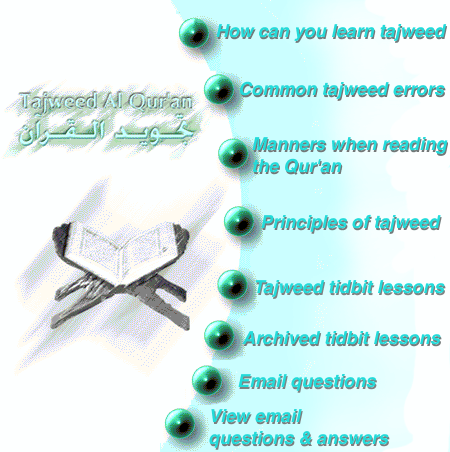|
|

copyright © 2002, abouttajweed.com, all rights reserved |
Question (29
Safar 1423/May 12, 2002) Assalamalaikum. I am trying tajweed by myself by repeating and reading the Qur’an with cassettes of famous qaris, but I’m still slow in memorising the Qur’an. I am now 40 and know I am not young, but when I was young I never read the holy Qur’an. Now my best form of relaxing is reciting the Qur’an with tajweed. I also hope to became a hafiz, but I can’t seem to memorize like before, although I am a financial consultant and I had passed professional exams in the past. Please advise me as I love reading the holy Qur’an and I want to continue, may Allah give me the memory to become a hafiz, as I have heard a hadith that the hafiz will be with the holy prophet on the day of qiyamah. Wasalaam. Question (25 Safar 1423/May 8, 2002) Masha
Allah, your questions and answers (especially the answers!) are informative
and enjoyable to read. May Allah grant you to keep up the site! This is a question about stops - I have asked you about stops before and am still struggling with these. In the following aayah there are quite a few "marked" stops so I thought I could try and learn from it:
The
interpretation of the meaning into English: 1.
At the small meem(
2.
Between the
3.
Between
(I
would be tempted to say it is better to read through form the beginning to the
4.
The last part starting at the
It
would be really appreciated if you could correct my understanding if, and when
it is convenient. Wa jazakumu Allah bi kulli khair. Question (21 Safar 1423/May 4, 2002) Greetings, How does the term used for "love" differ in this version from other translations? I have been told that the Koran does not contain the word "love," but that this translation does. Thank you. Question/statement (18 Safar 1423/May 1, 2002) Assalaamu
alaikum wa rahmatu Allah. May Allah reward you for your patience
in answering my question on the words, as I typed them:
Shortsighted! Question (14 Safar 1423/Apr. 27, 2002) Alhamduli Allah for your
site and your help! and may Allah reward you! There is al Ikhfa
ash-shafawee (
Question (11 Safar 1423/Apr. 24, 2002) Assalaam alaikum I want to teach some people tajweed and I cant find the Arabic letters, on any site. I found a couple some differences, e.g.. one did not have "ha" in the list , one did not have "lam-alif" in it and do on. do u have a complete list of the letters and may I print to teach form it please? Jazakullahu khair. Asslaamu
alaikum Question (10 Safar 1423/Apr. 23, 2002) Assalamu
alaykum wa rahmatullah. First, Thank you for this wonderful site. I would like to know what is the best way to learn Arabic for a non-Arabic. I am a student (engineering) with a "limited time". A friend told me about an open university for distance education (http://www.open-university.edu/), how do you rate such method. Also may you recommend some good grammar books. I already can read, and do understand some grammar basics. My objective is to be very fluent in Arabic. Thank you for your help Question (9
Safar 1423/Apr. 22, 2002) Do you have a web site
for Sheikh Ali Jabir Quran recitation? Question
(6
Safar 1423/Apr. 19, 2002) Assalamualaikum, In this site, I couldn't
find explanations about mad tamkin, idgham mutajaanisain, and idgham
mutaqaaribain. Could you pls add explanations on these rules, jazakumullahu khairan
katheera. Question (5
Safar 1423/Apr. 18, 2002) Could you please tell me
if the word:
Question (5
Safar 1423/Apr. 18, 2002) Assalaamun alaikum. Question (2 Safar 1423/Apr.
15, 2002) Alsalam Alaykum, Question
(2 Safar 1423/Apr.
15, 2002) Assalaamu
alaikum. I have a small question about a word like
May Allah reward you. |